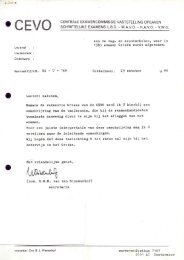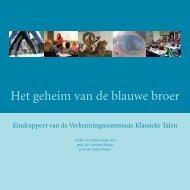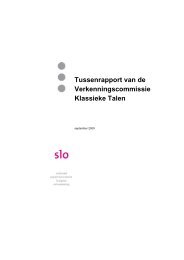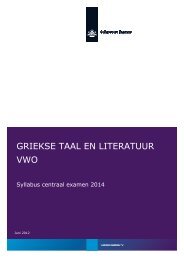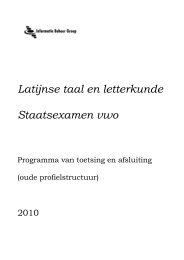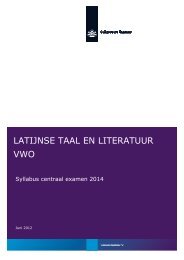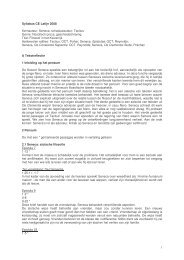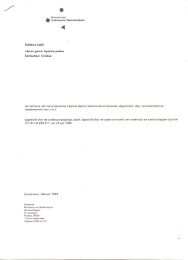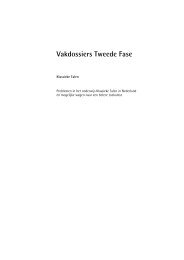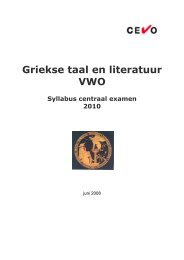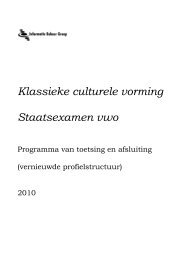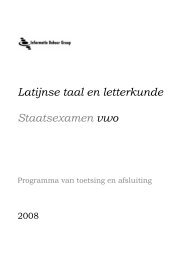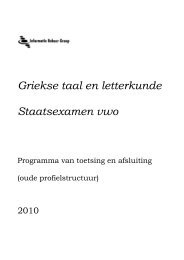Rome Wasn't Digitized in a Day - Council on Library and Information ...
Rome Wasn't Digitized in a Day - Council on Library and Information ...
Rome Wasn't Digitized in a Day - Council on Library and Information ...
Create successful ePaper yourself
Turn your PDF publications into a flip-book with our unique Google optimized e-Paper software.
212<br />
across virtual collecti<strong>on</strong>s of data. The importance of an <str<strong>on</strong>g>in</str<strong>on</strong>g>tegrated <str<strong>on</strong>g>in</str<strong>on</strong>g>frastructure for research by<br />
classicists has also been recognized by the VRE-SDM project:<br />
The aim of the VRE-SDM project has been to c<strong>on</strong>struct a pilot of an <str<strong>on</strong>g>in</str<strong>on</strong>g>tegrated envir<strong>on</strong>ment <str<strong>on</strong>g>in</str<strong>on</strong>g><br />
which data (documents), tools <strong>and</strong> scholarly <str<strong>on</strong>g>in</str<strong>on</strong>g>strumenta could be available to the scholar as a<br />
complete <strong>and</strong> coherent resource. Scholars who edit ancient documents are always deal<str<strong>on</strong>g>in</str<strong>on</strong>g>g with<br />
damaged or degraded texts <strong>and</strong> ideally require access to the orig<str<strong>on</strong>g>in</str<strong>on</strong>g>als, or the best possible<br />
facsimiles of the orig<str<strong>on</strong>g>in</str<strong>on</strong>g>als, <str<strong>on</strong>g>in</str<strong>on</strong>g> order to decipher <strong>and</strong> verify read<str<strong>on</strong>g>in</str<strong>on</strong>g>gs, <strong>and</strong> also to a wide range of<br />
scholarly aids <strong>and</strong> reference works (dicti<strong>on</strong>aries, name-lists, editi<strong>on</strong>s of comparable texts, <strong>and</strong><br />
so <strong>on</strong>) which are essential for <str<strong>on</strong>g>in</str<strong>on</strong>g>terpretati<strong>on</strong> of their texts (Bowman et al. 2010, 90).<br />
As Bowman et al. expla<str<strong>on</strong>g>in</str<strong>on</strong>g>ed, an <str<strong>on</strong>g>in</str<strong>on</strong>g>tegrated research envir<strong>on</strong>ment or cyber<str<strong>on</strong>g>in</str<strong>on</strong>g>frastructure will require<br />
access not <strong>on</strong>ly to primary sources but also to digital tools <strong>and</strong> to a wide range of preexist<str<strong>on</strong>g>in</str<strong>on</strong>g>g reference<br />
tools/works that will need to be adapted for the digital envir<strong>on</strong>ment. They also noted that many of the<br />
necessary collecti<strong>on</strong>s have already been created or digitized but are unfortunately scattered across the<br />
websites of various museums <strong>and</strong> libraries.<br />
To create a more <str<strong>on</strong>g>in</str<strong>on</strong>g>tegrated classical cyber<str<strong>on</strong>g>in</str<strong>on</strong>g>frastructure, Crane, Seales, <strong>and</strong> Terras propose a<br />
m<str<strong>on</strong>g>in</str<strong>on</strong>g>imum list of necessities, <str<strong>on</strong>g>in</str<strong>on</strong>g>clud<str<strong>on</strong>g>in</str<strong>on</strong>g>g libraries or repositories that can provide susta<str<strong>on</strong>g>in</str<strong>on</strong>g>able<br />
preservati<strong>on</strong>, “sophisticated citati<strong>on</strong> <strong>and</strong> reference l<str<strong>on</strong>g>in</str<strong>on</strong>g>k<str<strong>on</strong>g>in</str<strong>on</strong>g>g services,” new forms of electr<strong>on</strong>ic<br />
publicati<strong>on</strong>, new models of collaborati<strong>on</strong>, <strong>and</strong> a digital <str<strong>on</strong>g>in</str<strong>on</strong>g>frastructure that is portable across languages<br />
(Greek, Lat<str<strong>on</strong>g>in</str<strong>on</strong>g>, Ch<str<strong>on</strong>g>in</str<strong>on</strong>g>ese, Arabic, etc.). They c<strong>on</strong>clude with three strategies to beg<str<strong>on</strong>g>in</str<strong>on</strong>g> build<str<strong>on</strong>g>in</str<strong>on</strong>g>g this<br />
<str<strong>on</strong>g>in</str<strong>on</strong>g>frastructure: (1) optimiz<str<strong>on</strong>g>in</str<strong>on</strong>g>g mach<str<strong>on</strong>g>in</str<strong>on</strong>g>e translati<strong>on</strong> for the field of classics; (2) c<strong>on</strong>vert<str<strong>on</strong>g>in</str<strong>on</strong>g>g as much<br />
<str<strong>on</strong>g>in</str<strong>on</strong>g>formati<strong>on</strong> as possible <str<strong>on</strong>g>in</str<strong>on</strong>g>to mach<str<strong>on</strong>g>in</str<strong>on</strong>g>e-acti<strong>on</strong>able data; <strong>and</strong> (3) us<str<strong>on</strong>g>in</str<strong>on</strong>g>g can<strong>on</strong>ical literary texts that have<br />
already been marked up to serve as databases of l<str<strong>on</strong>g>in</str<strong>on</strong>g>guistic annotati<strong>on</strong>s.<br />
Crane et al. (2009a) provide an overview of the opportunities <strong>and</strong> challenges faced <str<strong>on</strong>g>in</str<strong>on</strong>g> mov<str<strong>on</strong>g>in</str<strong>on</strong>g>g from<br />
“small, carefully edited <strong>and</strong> curated digital collecti<strong>on</strong>s to very large, <str<strong>on</strong>g>in</str<strong>on</strong>g>dustrially produced collecti<strong>on</strong>s”<br />
with a focus <strong>on</strong> the role of classical collecti<strong>on</strong>s <strong>and</strong> knowledge sources. The authors stress the need to<br />
create a classical apographeme <strong>on</strong>l<str<strong>on</strong>g>in</str<strong>on</strong>g>e as an analogy to the genome, or the need to represent <strong>on</strong>l<str<strong>on</strong>g>in</str<strong>on</strong>g>e:<br />
… the complete record of all Greek <strong>and</strong> Lat<str<strong>on</strong>g>in</str<strong>on</strong>g> textual knowledge preserved from antiquity,<br />
ultimately <str<strong>on</strong>g>in</str<strong>on</strong>g>clud<str<strong>on</strong>g>in</str<strong>on</strong>g>g every <str<strong>on</strong>g>in</str<strong>on</strong>g>scripti<strong>on</strong>, papyrus, graffito, manuscript, pr<str<strong>on</strong>g>in</str<strong>on</strong>g>ted editi<strong>on</strong> <strong>and</strong> any<br />
writ<str<strong>on</strong>g>in</str<strong>on</strong>g>g bear<str<strong>on</strong>g>in</str<strong>on</strong>g>g medium. This apographeme c<strong>on</strong>stitutes a superset of the capabilities <strong>and</strong> data<br />
that we <str<strong>on</strong>g>in</str<strong>on</strong>g>herit from pr<str<strong>on</strong>g>in</str<strong>on</strong>g>t culture but it is a qualitatively different <str<strong>on</strong>g>in</str<strong>on</strong>g>tellectual space (Crane et al.<br />
2009a).<br />
This argument focuses <strong>on</strong> the need to represent all Greek <strong>and</strong> Lat<str<strong>on</strong>g>in</str<strong>on</strong>g> sources <strong>on</strong>l<str<strong>on</strong>g>in</str<strong>on</strong>g>e <str<strong>on</strong>g>in</str<strong>on</strong>g> an <str<strong>on</strong>g>in</str<strong>on</strong>g>tegrated<br />
envir<strong>on</strong>ment, whether <str<strong>on</strong>g>in</str<strong>on</strong>g>scribed <strong>on</strong> st<strong>on</strong>e or pr<str<strong>on</strong>g>in</str<strong>on</strong>g>ted <str<strong>on</strong>g>in</str<strong>on</strong>g> a book. Match<str<strong>on</strong>g>in</str<strong>on</strong>g>g these new <strong>on</strong>l<str<strong>on</strong>g>in</str<strong>on</strong>g>e collecti<strong>on</strong>s<br />
with advanced OCR <strong>and</strong> other applicati<strong>on</strong>s, Crane et al. (2009a) expla<str<strong>on</strong>g>in</str<strong>on</strong>g>, is currently support<str<strong>on</strong>g>in</str<strong>on</strong>g>g a<br />
number of important new services, <str<strong>on</strong>g>in</str<strong>on</strong>g>clud<str<strong>on</strong>g>in</str<strong>on</strong>g>g the creati<strong>on</strong> of multitexts, chr<strong>on</strong>ologically deeper<br />
corpora, <strong>and</strong> new “textual forms of bibliographic research.” In this new world, the authors argue, all<br />
classicists are also act<str<strong>on</strong>g>in</str<strong>on</strong>g>g as corpus l<str<strong>on</strong>g>in</str<strong>on</strong>g>guists.<br />
A large part of this paper is dedicated to outl<str<strong>on</strong>g>in</str<strong>on</strong>g><str<strong>on</strong>g>in</str<strong>on</strong>g>g the services required for humanities users <str<strong>on</strong>g>in</str<strong>on</strong>g> massive<br />
digital collecti<strong>on</strong>s, <str<strong>on</strong>g>in</str<strong>on</strong>g>clud<str<strong>on</strong>g>in</str<strong>on</strong>g>g access to physical images of sources, transcripti<strong>on</strong>al data, basic page<br />
layout <str<strong>on</strong>g>in</str<strong>on</strong>g>formati<strong>on</strong>, semantic markup with<str<strong>on</strong>g>in</str<strong>on</strong>g> a text, dynamically generated knowledge, <strong>and</strong>, f<str<strong>on</strong>g>in</str<strong>on</strong>g>ally,<br />
“l<str<strong>on</strong>g>in</str<strong>on</strong>g>guistically labeled, mach<str<strong>on</strong>g>in</str<strong>on</strong>g>e acti<strong>on</strong>able knowledge.” The importance of access to “mach<str<strong>on</strong>g>in</str<strong>on</strong>g>eacti<strong>on</strong>able<br />
knowledge” <strong>and</strong> the need for creators of digital classics resources to create data <strong>and</strong> sources



